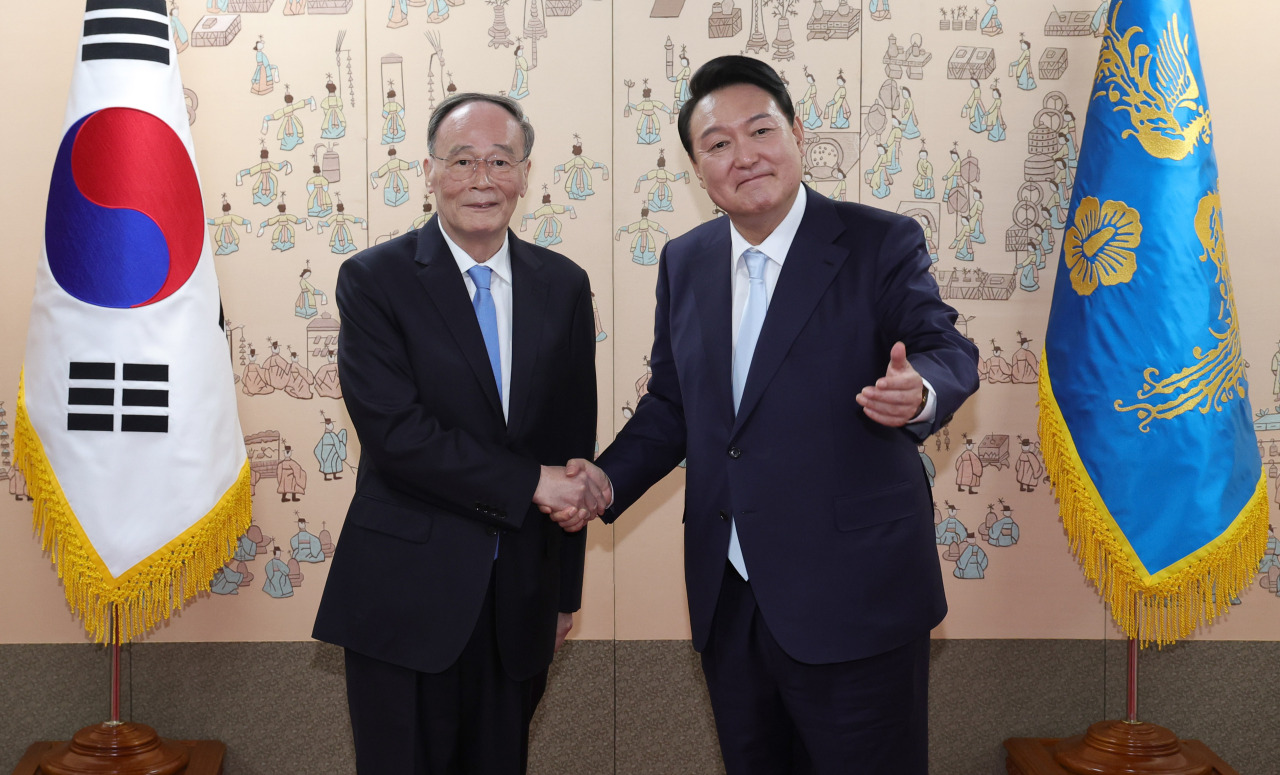South Korea should sort out its priorities and pursue a strategic partnership with China on an equal standing while maintaining a strong alliance with the US, amid apparent efforts by Beijing and Washington to bolster ties with Seoul, experts said on Wednesday.
To celebrate the inauguration of South Korea’s new president, Yoon Suk-yeol, China sent Vice President Wang Qishan, a close aide of its president, Xi Jinping, and the highest-level official to visit the country for such an event.
In his meeting with Yoon on Tuesday, Wang relayed Xi’s invitation for Yoon to visit China. Wang also made an unusual proposal to enhance bilateral relations which included improving bilateral communication, economic cooperation and establishing a free trade agreement.
According to Chung Jae-hung, a research fellow at the Sejong Institute, these actions from China reflect its intention to keep the US in check, as the new South Korean president has made clear of his intention to build closer ties with Washington.
As the US and China move aggressively to reorganize the world order, it poses a difficult question for South Korea on how it should position itself between the two powers. And it is crucial for South Korea to not tilt too much on one side, so that it can make strategic decisions while maintaining balance, Chung told The Korea Herald.
“The Russia-Ukraine War could be interpreted as a proxy war between the US and the West against Russia. South Korea is also similarly positioned geopolitically, so keeping a balance is important,” Chung said.
But the stance of “strategic ambivalence” followed by the previous administration should be discarded, as it has only weakened Korea’s standing between the US and China, the Institute of Foreign Affairs and National Security said in a report.
The former Moon Jae-in administration had been largely reliant on China for trade and Korea’s economic interests, which affected its security policies. This in turn led to the weakening of Korea’s alliance with the US, the report said.
China is South Korea’s biggest trading partner, while the US is South Korea’s key military ally.
In the report, IFANS suggested the government should pursue enhancement in relations with China, but then it should be based on strong alliance with the US, and also, Japan.
South Korea and China’s relations have been lukewarm, recovering only slightly after it hit rock bottom with South Korea’s deployment of the US-made Terminal High Altitude Area Defense (THAAD) anti-missile system here in 2017.
At the time, China had launched a boycott of South Korean businesses and imports in retaliation, which put a big dent on the Korean economy.
In the meeting with Yoon on Tuesday, the Chinese vice president also did not miss the chance to mention China’s discomfort at South Korea’s deployment of THAAD.
“We should bolster cooperation over issues on the Korean Peninsula and take care of sensitive issues in a rational manner,” Wang said. China has often referred to Korea’s deployment of the US-made missile defense system as a “sensitive issue.”
In his campaign, Yoon had pledged to deploy a second THAAD battery. But aware that the decision could rekindle conflict with China, the Yoon administration appears to be taking a step back on its initial proposal.
It left out the deployment plan from its list of key policy tasks, and the new defense minister who took office on Wednesday explained that the government is reviewing other options for national defense.
In his report on the challenges and tasks for the new government, Chung of the Sejong Institute also underscored the need for Korea and China’s joint efforts to explore new industries.
Meanwhile, Yoon is moving to reinforce Korea’s alliance with the United States. As the US is likely to launch its Indo-Pacific Economic Framework around the time when the US President Joe Biden visits Seoul and Tokyo later on this month, South Korea is likely to join the group.
“We have maintained that we may participate in regional consultative groups that are open, inclusive and transparent. Against this background, we are positively reviewing the proposal to join the IPEF, and are currently discussing the matter with related countries, including the United States,” South Korea’s Foreign Ministry said on Wednesday.
The US-led entity, which intends to build a regional supply chain with key nations, is widely seen as the US’ efforts to keep China in check from wielding influence in the Asia-Pacific region.
By Jo He-rim (
herim@heraldcorp.com)








![[Today’s K-pop] Blackpink’s Jennie, Lisa invited to Coachella as solo acts](http://res.heraldm.com/phpwas/restmb_idxmake.php?idx=644&simg=/content/image/2024/11/21/20241121050099_0.jpg)